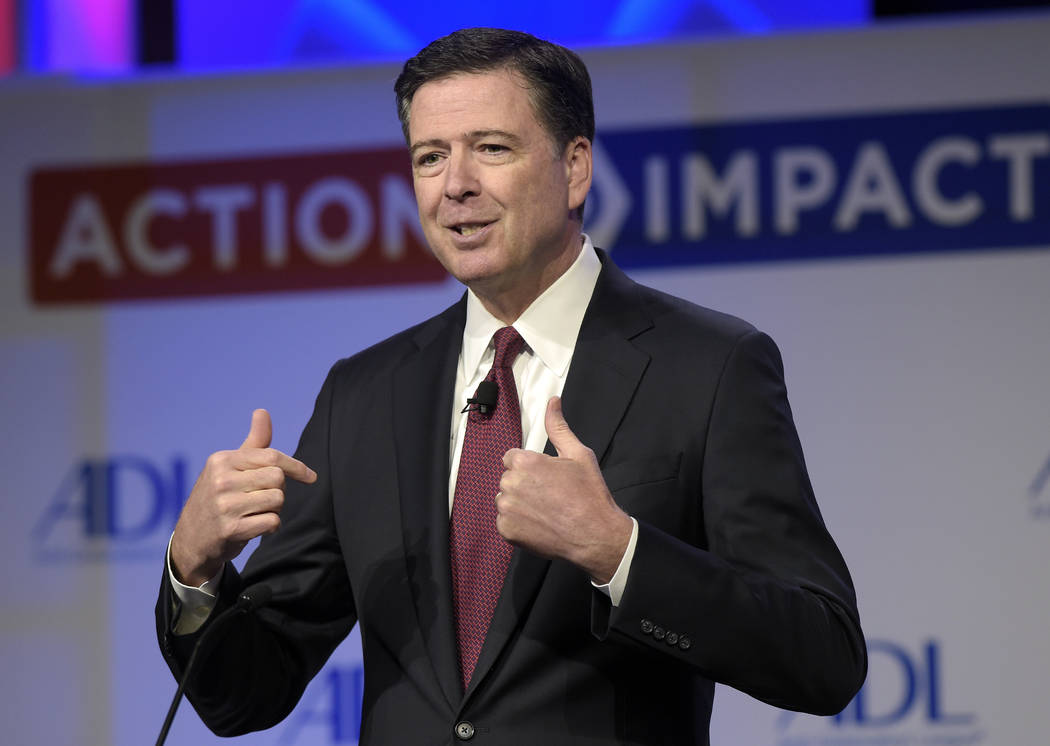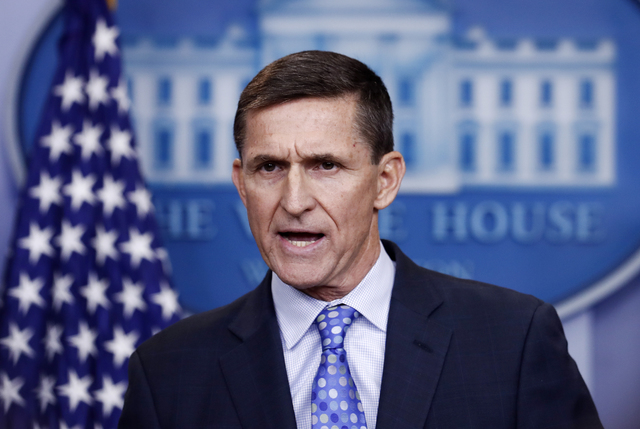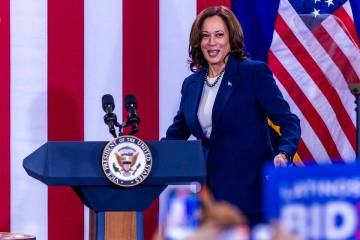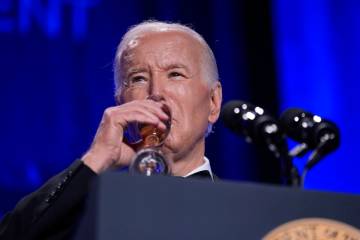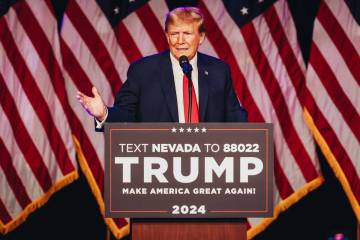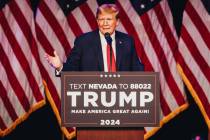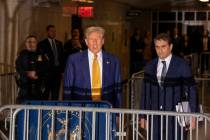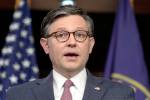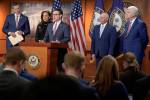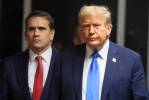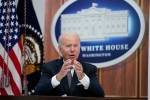White House denies report that Trump asked Comey to end Flynn investigation
WASHINGTON — President Donald Trump personally appealed to FBI Director James Comey to abandon the bureau’s investigation into National Security Adviser Michael Flynn, according to notes disclosed late Tuesday that Comey wrote after the meeting. The White House issued a furious denial near the end of a tumultuous day spent beating back potentially disastrous news reports from dawn to dusk.
The bombshell Comey news came as the beleaguered administration was still struggling mightily to explain Monday’s revelation that the president had disclosed highly classified information to the Russian foreign minister and the country’s ambassador to the United States.
Defending Trump’s actions, officials played down the importance and secrecy of the information, which had been supplied by Israel under an intelligence-sharing agreement, and Trump himself said he had “an absolute right” as president to share “facts pertaining to terrorism” and airline safety with Russia. Yet U.S. allies and some members of Congress expressed concern bordering on alarm.
As for Comey, whom Trump fired last week, the FBI director wrote in a memo after a February meeting at the White House that the new president had asked him to shut down the FBI’s investigation of Flynn and his Russian contacts, said a person who had read the memo. The Flynn investigation was part of a broader probe into Russian interference in last year’s presidential election.
Comey’s memo, an apparent effort to create a paper trail of his contacts with the White House, would be the clearest evidence to date that the president has tried to influence the investigation.
Rep. Jason Chaffetz, Republican chairman of the House oversight committee, sent a letter to the FBI on Tuesday requesting that it turn over all documents and recordings that detail communications between Comey and Trump. He said he would give the FBI a week and then “if we need a subpoena we’ll do it.”
The panel’s top Democrat, Elijah Cummings of Maryland, a constant Trump critic, called the allegation of Trump pressure on Comey “explosive” and said “it appears like a textbook case of criminal obstruction of justice.”
Republicans weren’t going that far. But John McCain, chairman of the Senate Armed Services Committee, said the Trump-Russia reports were “deeply disturbing” and could impede allies’ willingness to share intelligence with the U.S.
Mitch McConnell, the Republican leader of the Senate, said simply: “It would be helpful to have less drama emanating from the White House.”
The person who described the Comey memo to the AP was not authorized to discuss it by name and spoke on condition of anonymity. The existence of the memo was first reported Tuesday by The New York Times.
The White House vigorously denied it all. “While the president has repeatedly expressed his view that General Flynn is a decent man who served and protected our country, the president has never asked Mr. Comey or anyone else to end any investigation, including any investigation involving General Flynn,” a White House statement said.
Trump fired Flynn on Feb. 13, on grounds that he had misled Vice President Mike Pence and other officials about his contacts with Russians.
The intensifying drama comes as Trump is set to embark Friday on his first foreign trip, which had been optimistically viewed by some aides as an opportunity to reset an administration floundering under an inexperienced president.
When Trump fired Comey, he said he did so based on Comey’s very public handling of the Hillary Clinton email probe and how it affected his leadership of the FBI. But the White House has provided differing accounts of the firing. And lawmakers have alleged that the sudden ouster was an attempt to stifle the bureau’s investigation into Trump associates’ ties to Russia’s meddling in the campaign.
Mark Warner of Virginia, top Democrat on the Senate intelligence committee, said he would ask Comey for additional material as part of that panel’s investigation. “Memos, transcripts, tapes — the list keeps getting longer,” he said.
According to the Times, Comey wrote in the February memo that Trump told him Flynn had done nothing wrong. Comey said he replied that “I agree he is a good guy” but said nothing to Trump about limiting the investigation.
The newspaper said Comey was in the Oval Office that day with other national security officials for a terrorism threat briefing. When that ended, Trump asked everyone to leave except Comey, and he eventually turned the conversation to Flynn.
The administration spent the first half of Tuesday defending Trump’s disclosure of classified information to senior Russian officials. National Security Adviser H.R. McMaster said the president’s comments were “wholly appropriate.” He used that phrase nine times in his briefing to reporters.
The White House has grown suspicious about the volume and timing of the seemingly never-ending stream of leaks about the president, said one senior administration official who spoke on condition of anonymity to reflect on the feeling inside the West Wing. The official questioned why — if Comey had concerns about his conversations with the president — the FBI director hadn’t shared them with the deputy director, the Department of Justice and Congress at the time.
The highly classified information about an Islamic State plot was collected by Israel, a crucial source of intelligence and close partner in the fight against some of the America’s fiercest threats in the Middle East. Trump’s disclosure of the information threatened to fray that partnership and piled pressure on the White House to explain the apparently on-the-spot decision to reveal the information to Russian diplomats in the Oval Office.
A U.S. official who confirmed the disclosure to The Associated Press said the revelation potentially put the source at risk.
In a statement, Israel’s ambassador to the U.S., Ron Dermer, said the partnership between the U.S and Israel was solid.
A look at key moments in Comey’s tenure, the lead-up to Trump’s decision to fire him and developments since then:
Sept. 4, 2013: Comey is sworn in to office as the seventh director of the FBI. He was nominated for the post by President Barack Obama and confirmed by the Senate.
July 5, 2016: He holds news conference to announce that “no reasonable prosecutor” would bring criminal charges against Hillary Clinton, the Democratic presidential candidate, over her email practices as secretary of state, but criticizes Clinton and her staff for being “extremely careless” in their handling of classified material.
July 5, 2016: Republican presidential candidate Donald Trump calls the FBI’s decision not to bring criminal charges against Clinton the greatest example yet that the system is “rigged.”
July 7, 2016: Comey vigorously defends the decision not to prosecute Clinton over her use of a private email server as secretary of state. Under an onslaught of Republican criticism, Comey says that to charge Clinton would have been unwarranted and mere “celebrity hunting.”
Oct. 28, 2016: Days before the election, Comey informs Congress by letter that he is reopening the investigation into Clinton’s email practices based on new evidence, citing the discovery of emails on a laptop used by a top Clinton aide. Justice Department officials warn Comey against sending the letter, saying that doing so would be inconsistent with department policy meant to avoid the appearance of prosecutorial interference or meddling in elections.
Oct. 28, 2016: Trump reacts to FBI’s decision to investigate new messages related to Clinton’s emails, telling a campaign rally that he has “great respect for the FBI for righting this wrong.”
Nov. 6, 2016: Comey tells Congress in a follow-up letter that a review of newly discovered Clinton emails has “not changed our conclusions” that she should not face criminal charges.
Nov. 6, 2016: Trump criticizes Comey’s second letter to Congress, saying Clinton was being protected by a “rigged system” and pronouncing her “guilty,” despite the FBI’s conclusion that criminal charges were unwarranted.
Nov. 8, 2016: Trump is elected president.
Nov. 12, 2016: During a telephone call with top campaign donors, Clinton blames Comey for her defeat by Trump. Clinton said her campaign was on track to win the election until Comey sent the letter to Congress on Oct. 28.
Nov. 13, 2016: In a CBS “60 Minutes” broadcast after the election, Trump says he hasn’t decided whether to keep Comey.
Jan. 6, 2017: Comey is among a group of four top U.S. intelligence officials who brief the president-elect on their conclusions that Russia meddled in the presidential election on his behalf. Trump tells The Associated Press by telephone after the meeting that he “learned a lot” but declines to say whether he accepted their conclusion about Russia.
Jan. 22, 2017: Two days after taking office, Trump appears to single out Comey at a White House reception to thank law enforcement officers and others that helped during the inauguration. Trump calls Comey over to where he is standing in the Blue Room to offer a handshake and a partial hug, then comments that Comey has “become more famous than me.”
Jan. 27, 2017: At one-on-one dinner at the White House, Trump asks Comey to pledge his loyalty to the president and Comey declines, according to a person close to Comey, speaking after the FBI director was fired. The White House denies that account.
Feb. 14, 2017: Comey speaks with Trump in the Oval Office a day after Flynn is ousted. A memo that Comey wrote after the meeting, which became public May 16, says Trump asked him to shut down the FBI investigation into Flynn and his Russia ties.
March 8, 2017: During a cybersecurity conference at Boston College, Comey says he plans to serve his entire 10-year term, quipping, “You’re stuck with me for another 6½ years.”
March 20, 2017: Comey testifies to Congress that the FBI has been investigating possible links between Trump associates and Russian officials since July, the same month he held an unusual news conference to discuss the investigation into Clinton. Comey had previously refused to acknowledge the parallel Trump investigation, and his disclosure enrages Democrats who already blamed Comey for costing Clinton the presidency.
March 20, 2017: Comey testifies at the same hearing that the FBI and Justice Department have no information to back up Trump’s unsubstantiated claim on Twitter that Obama wiretapped him before the election.
May 2, 2017: Clinton again lays part of the blame for losing the election on Comey’s Oct. 28 letter. “If the election were on Oct. 27, I would have been your president,” she tells a women’s luncheon in New York.
May 3, 2017: Testifying before the Senate Judiciary Committee, Comey insists he was consistent in his handling of the separate investigations into Clinton and Trump. Comey also says it made him feel “mildly nauseous” to think his actions in October might have influenced the election outcome. But he tells senators: “I can’t consider for a second whose political futures will be affected and in what way. We have to ask ourselves what is the right thing to do and then do it.”
May 9, 2017: Comey sends Congress a letter correcting his prior sworn testimony regarding emails handled by longtime Clinton associate Huma Abedin. Comey had told Congress that Abedin had sent “hundreds and thousands” of emails to her husband’s laptop, including some with classified information. The two-page, follow-up letter said that, in fact, only “a small number” of the thousands of emails found on the laptop had been forwarded there while most had simply been backed up from electronic devices.
May 9, 2017: Trump abruptly fires Comey. “It is essential that we find new leadership for the FBI that restores public trust and confidence in its vital law enforcement mission,” Trump states in a letter addressed to Comey. In announcing the firing, the White House circulates scathing memo, written by Deputy Attorney General Rod Rosenstein criticizing Comey’s handling of the Clinton probe.
May 11, 2017: Trump, in an NBC interview, says he had been intending to fire Comey — whom he derided as a “showboat” and “grandstander” — for months. He denies it had anything to do with the Russia investigation, but also says: “In fact when I decided to just do it, I said to myself, I said you know, this Russia thing with Trump and Russia is a made-up story.”
May 12, 2017: Trump tweets that Comey “better hope that there are no ‘tapes’ of our conversations before he starts leaking to the press!”
May 16, 2017: A person familiar with the situation tells The Associated Press that Comey wrote a memo after the Feb. 14 meeting with the president that said Trump had asked him to shut down the FBI investigation into Flynn. The person had seen the memo but was not authorized to discuss it by name and spoke on condition of anonymity. The White House denies the account. Rep. Jason Chaffetz, the Republican chairman of a House oversight panel, vows to get copies of any memos Comey wrote about meetings with Trump, tweeting: “I have my subpoena pen ready.”
RELATED
White House explains delay in firing Flynn
Timing, optics of Comey firing not in Trump's favor — ANALYSIS
Trump abruptly fires FBI Director James Comey
Changing Comey story underscores pitfalls facing Trump's communications staff
Trump revealed highly classified intel to Russians, officials say
Here are Trump's 11 candidates for FBI director
Sandoval's name floated as next FBI director



